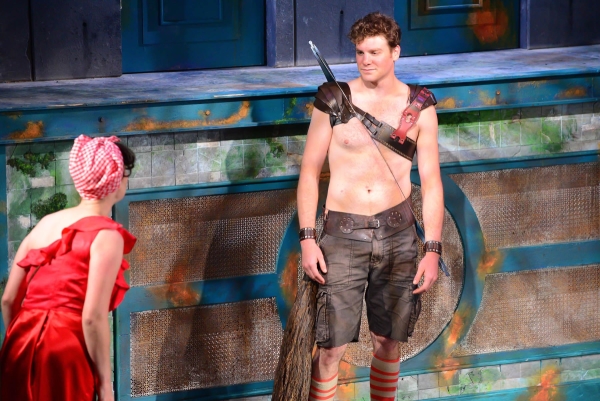
(© Evan Hanover)
All the predictable adjectives apply. At 12 hours, Sean Graney’s adaptation of all 32 extant Greek tragedies is a sprawling, gargantuan undertaking that demands a significant commitment from its audience. But there’s much more to this audacious effort than sheer volume. In shaping the surviving works of Aeschylus, Sophocles, and Euripides into a single blood-, sex-, ecstasy-, and agony-drenched behemoth, Graney has crafted an elliptical and fascinating production. The piece is a sharp, funny exploration of the Big Questions that will forever haunt us tiny, plodding mortals.
"Joy is just misery in messy clown makeup," says Medea in a line that captures the dueling forces at work in the human condition. It’s a fatalistic sentiment that runs the course of All Our Tragic. As the production winds its way through the tales of incestuous kings, human sacrifice, scorned women, and raging wars, it whipsaws between light and dark, cheeky humor and devastating sadness. It’s a storm of glitter cut with ground glass, a staging that’s equal parts sparkles and gore, irreverent bombast and stripped-down subtleties.
Graney, the adapter and director, captures the despair and optimism that define human life. The cold reality that doom gets us all sooner or later is never far from sight in All Our Tragic. Still, Graney has created a show that delivers bountiful belly laughs along with a strong strain of fatalism. The humor of hubris is plentiful here, and so is the wry laughter that comes from watching the clueless shenanigans of puny humans who have no idea that their most strenuous exertions are no match for the Fates.
All Our Tragic is packaged into manageable segments (you never go longer than 90 minutes without an intermission). There’s Physics, which centers on the labors of Herekles; Politics, which deals with intrigue in Thebes; Patriotics, which covers the Trojan war; and Poetics, wherein those screaming Furies make their presence known and we learn that Helen of Troy wasn’t kidnapped after all, but sat out the Trojan war on an exotic island inhabited by hairy talking foliage.
The narrative is a long, tall tale of myths familiar and obscure, from the Seven Sisters (whose magically youthful properties allow them to "age like packaged snack foods") to Oedipus to Antigone. The cast of nearly two dozen takes on too many roles to count, including gods, monsters, and — during Ajax’s hallucinatory slaughter of sheep, which he’s convinced are soldiers — a cottony-white herd of farmyard animals.
The 23-member ensemble is furiously engaging. Tien Doman’s Klytaimnestra, decked out in an impossibly cheerful June Cleaver-esque sundress, spouts the hardened, melancholy wisdom of someone who has seen and survived horrors. As Kassandra, Christine Stulik is memorably haunting, littering the stage with knitted hearts as a prophetess who is gifted/cursed with a memory that unfolds in reverse; she forgets what has already happened and "remembers" what is to come. Zeke Sulkes brings a politically savvy slickness to Kreon, and Walter Briggs' buff, brawny Heralkes takes the trope of the handsome chucklehead and turns it into something deep and rich. Graney has three women — Odd Job Alice, Odd Job Erdie, and Odd Job Sophie — act as the chorus, appearing as deceptively ordinary cleaning ladies or nurses at the top of each section, and providing musical interludes throughout. Erin Myers (Alice), Kate Carson-Groner (Erdie), and Lauren Vogel (Sophie) are alternately charming, poignant, and otherworldly. They provide a tuneful, thoughtful through-line that runs the length of All Our Tragic.
With nine hours of performed material and three hours of meal/snack breaks (you can break the show up over multiple nights, if you’re so inclined), this is one Greek feast of a show you’ll want to spend 12 hours devouring.









